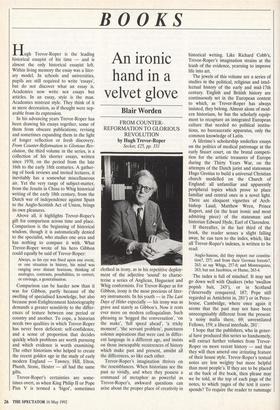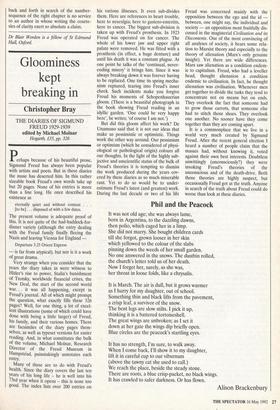BOOKS
An ironic hand in a velvet glove
Blair Worden
FROM COUNTER- REFORMATION TO GLORIOUS REVOLUTION by Hugh Trevor-Roper Secker, £25, pp. 331 Hugh Trevor-Roper is the leading historical essayist of his time — and is almost the only historical essayist left. Within living memory the essay was a liter- ary model. In schools and universities, pupils are still required to write 'essays', but do not discover what an essay is. Academics now write not essays but articles. In an essay, style is the man. Academics mistrust style. They think of it as mere decoration, as if thought were sep- arable from its expression.
In his advancing years Trevor-Roper has been drawing his essays together, some of them from obscure publications, revising and sometimes expanding them in the light of longer reflection or fresh discovery. From Counter-Reformation to Glorious Rev- olution, the third volume in the series, is a collection of his shorter essays, written since 1970, on the period from the late 16th to the early 18th centuries. A gather- ing of book reviews and invited lectures, it inevitably has a somewhat miscellaneous air. Yet the very range of subject-matter, from the Jesuits in China to Whig historical writing of the early 18th century, from the Dutch war of independence against Spain to the Anglo-Scottish Act of Union, brings its own pleasures.
Above all, it highlights Trevor-Roper's gift for comparison across time and place.
Comparison is the beginning of historical wisdom, though it is automatically denied to the specialist, who studies one area and has nothing to compare it with. What Trevor-Roper wrote of his hero Gibbon could equally be said of Trevor-Roper:
Always, as his eye was fixed upon one event, or one situation in history, his mind was ranging over distant horizons, thinking of analogies, contrasts, possibilities, to correct, or envisage, a generalisation.
Comparison can be harder now than it was for Gibbon, partly because of the swelling of specialised knowledge, but also because post-Enlightenment historiography demands a greater sensitivity to the differ- ences of texture between one period or country and another. To cope, a historian needs two qualities in which Trevor-Roper has never been deficient: self-confidence, and a sense of proportion that decides quickly which problems are worth pursuing and which evidence is worth examining. The other historians who helped to create the recent golden age in the study of early modern England — Tawney, Hill, Elton, Plumb, Stone, Hexter — all had the same gifts.
Trevor-Roper's certainties are some- times overt, as when King Philip II or Pope Pius V is termed a 'bigot', sometimes clothed in irony, as in his repetitive deploy- ment of the adjective 'sound' to charac- terise a series of Anglican, Huguenot and Whig conformists. For Trevor-Roper as for Gibbon, irony is the most precious of liter- ary instruments. In his youth — in The Last Days of Hitler especially — his irony was as grave and stately as Gibbon's. Now it rests ever more on modern colloquialism. Such phrasing as 'hogged the conversation', 'on the make', 'full speed ahead', 'a tricky moment', 'the servant problem', punctures solemn aspirations that were cast in differ- ent language in a different age, and insists on those inescapable recurrences of history which make past and present, amidst all the differences, so like each other.
Trevor-Roper's imagination thrives on the resemblances. When historians see the past so vividly, and when they possess a command of metaphor as powerful as Trevor-Roper's, awkward questions can arise about the proper place of creativity in historical writing. Like Richard Cobb's, Trevor-Roper's imagination strains at the leash of the evidence, yearning to improve life into art.
The jewels of this volume are a series of studies in the political, religious and intel- lectual history of the early and mid-17th century. English and British history are continuously set in the European context to which, as Trevor-Roper has always insisted, they belong. Almost alone of mod- ern historians, he has the scholarly equip- ment to recapture an integrated European culture that needed no political institu- tions, no bureaucratic apparatus, only the common knowledge of Latin.
A lifetime's scholarship underlies essays on the politics of medical patronage at the early Stuart court, on the brutal competi- tion for the artistic treasures of Europe during the Thirty Years War, on the attempts of the Dutch jurist and statesman Hugo Grotius to build a universal Christian church modelled on the Church of England: all unfamiliar and apparently peripheral topics which prove to place familiar and central ones in a novel light. There are eloquent vignettes of Arch- bishop Laud, Matthew Wren, Prince Rupert, and (in the least ironic and most admiring piece) of the statesman and historian Edward Hyde, Earl of Clarendon.
If thereafter, in the last third of the book, the reader senses a slight falling away, he can turn to the index, which, like all Trevor-Roper's indexes, is written to be read:
Anglo-Saxons, did they import our constitu- tion?, 257; and from their German forests?, 263; so say Whigs, 257-8; and Montesquieu, 263; but not Jacobites, or Hume, 263-4.
The index is full of mischief. It may not go down well with Quakers (who 'swallow popish bait, 243'), or in Scotland ('deservedly conquered, 187; Pope still regarded as Antichrist in, 281') or in Peter- house, Cambridge, where once again it seems that the past may not have been unrecognisably different from the present: 'a noisy mafia there, 69; unventilated Fellows, 159; a liberal interlude, 281'.
I hope that the publishers, who in gener- al have produced this series so handsomely, will extract further volumes from Trevor- Roper on more recent history — and that they will then amend one irritating feature of their house style. Trevor-Roper's textual notes are less weighty but more helpful than most people's. If they are to be placed at the back of the book, then please may we be told, at the top of each page of the notes, to which pages of the text it corre- sponds? To require the reader to rummage back and forth in search of the number- sequence of the right chapter is no service to an author in whose writing the courte- sies of clarity exert so absolute a claim.
Dr Blair Worden is a fellow of St Edmund Hall, Oxford.



















































 Previous page
Previous page